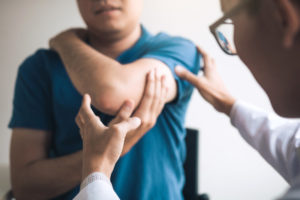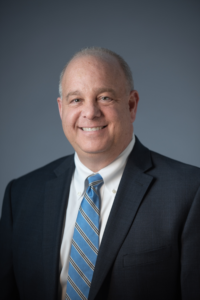Twenty years ago this September, 80 organizations representing healthcare professionals and consumers nationwide joined the American Chronic Pain Association to establish “Pain Awareness Month.” The intent of the annual observation—to improve recognition, understanding, and treatment of severe pain—is perhaps even more relevant now than it was at its founding. Today, a staggering 100 million Americans suffer from significant pain and its ill effects.
Many among that group have advanced-stage cancer. And according to the National Cancer Institute, 80% of cancer patients have moderate to severe pain that negatively affects their functional status and quality of life. Beyond the symptoms of cancer itself, treatment for the disease—including radiation, chemotherapy, and other drugs—may produce unwanted side effects, resulting in painful or uncomfortable new issues such as swelling, nausea, shortness of breath, even depression.
But regardless of the cause, you don’t have to live with chronic, serious pain. Through sophisticated technology and precision pain relief, Capital Caring Health’s Schaufeld Family Advanced Pain Clinic (SAPC) can help you or your loved one return to the comforts of simple daily activities and to the pursuits that bring joy.
Advanced Treatment for Advanced Pain
Patients are typically referred to SAPC when pain becomes severe, and medication, the most common treatment, is no longer effective. While the majority of SAPC’s patients have cancer, the clinic can also help with the symptoms and side-effects of dementia, congestive heart failure, chronic obstructive pulmonary disease, osteoarthritis, neuropathy, and neurological diseases (Multiple Sclerosis, Parkinson’s Disease, ALS).
The process begins with evaluating the patient for limitations, mobility problems, and other major issues that may affect treatment options and outcomes. Then the team uses the most advanced technology and imaging techniques to arrive at the correct diagnosis and a minimally invasive intervention plan that targets pain at the source.
“We start with the most effective, conservative approaches, and expand to sophisticated, surgical interventions as needed to bring relief from pain and discomfort,” says Michael Byas-Smith, MD, Medical Director of the clinic, and a well-known expert in pain management with decades of experience with cancer patients. “The techniques we perform are better and safer than the long-term use of general oral or intravenous analgesic/pain relievers and opioids, which carry their own set of problems.”
The expertise of Dr. Byas-Smith and the clinic in the successful use of interventional pain relief is well-known throughout the mid-Atlantic region and has attracted referrals from some of the region’s most prominent health systems. As a result, the SAPC frequently treats patients from INOVA’s Schar Cancer Institute at Fairfax Hospital, Johns Hopkins Kimmel Cancer Center at Sibley Memorial Hospital, Medstar Georgetown Lombardi Comprehensive Cancer Center, and others.
In every case, Dr. Byas-Smith works with the patient’s oncologist, neurologist, internist, or other referring physician so they know the details of the diagnosis and treatment. Some pain interventions may affect or interact with other therapies prescribed for the underlying disease.
At the Forefront of Pain Management
Capital Caring Health’s Schaufeld Family Advanced Pain Clinic offers a full range of pain intervention, including:
- Neurolytic therapies to block pain for extended periods of time often resulting in increased mobility, reduced or elimination of opioid (morphine) medications and often complete relief of pain.
- Intrathecal pump therapies, whereby an implanted pump delivers medication directly to the spinal cord.
- Epidural and major joint injections to reduce pain and improve mobility.
- Injections for axial spine fractures.
- Aspiration (paracentesis or thoracentesis) to remove excess fluid from the abdomen or lungs, respectively, reducing discomfort and improving breathing.
In fact, as a single provider, Dr. Byas-Smith performs more abdomen and lung aspirations than any other group in the region. This service eliminates many ER visits and hospitalizations for our clients. CCH treats patients right in the clinic for expedited care and patient convenience. Dr. Byas-Smith is also a proponent of withdrawing all of the excess fluid, versus the partial extraction most providers do nowadays.
“Removing all of the accumulated fluid provides a greater benefit to the patient,” says Dr. Byas-Smith, who is gathering data on the effectiveness of total removal for analysis and publication. “Performing the aspiration right in the clinic is also much more cost effective than expensive emergency room or hospital care. I hope my experience and success with total aspiration may influence the traditional practice industry-wide for better patient outcomes and greater cost efficiency.”
Care for the Whole Person
Even when they share the same diagnosis with others, each patient who seeks care for severe pain is completely different. Such factors as stage of illness, pain tolerance, coping abilities, family dynamics, and more can all influence how a patient experiences pain. However, the condition is always most effectively managed by caring for the whole person, and not just treating the symptom.
At CCH, additional services may also help someone cope with pain by treating depression, emotional, and spiritual distress. We offer many types of counseling and support groups for individuals and families.
The pain clinic began as a place to treat the advanced symptoms of CCH hospice patients and has grown to help other patients in our care, as well as the broader community. Building on our reputation—with the generous support of the Schaufeld family—we are poised to do more.
But relieving pain and suffering will always be at the heart of our program.
Says Dr. Byas-Smith, “Patients come in with pain, and we help them leave to have a better day, and a better quality of life.”
To learn more, please call the Capital Caring Health helpline 24/7 at (800) 869-2136.



 Dr. Cheryl-Lynne McCalla, DO
Dr. Cheryl-Lynne McCalla, DO Kathleen Ramkaran, RN, CCM
Kathleen Ramkaran, RN, CCM Hali Gantumur
Hali Gantumur Yasmin
Yasmin  Jennifer Olsen GNP-BC
Jennifer Olsen GNP-BC Meena Raj, MD,
Meena Raj, MD, 

 Kimberly Grove
Kimberly Grove
 Pat Bishop
Pat Bishop Elizabeth Ariemma
Elizabeth Ariemma Ray Jay Garcia, M.D.
Ray Jay Garcia, M.D.
 Heidi Young
Heidi Young Matt Kestenbaum
Matt Kestenbaum
 Anne Silao-Solomon, M.D.
Anne Silao-Solomon, M.D. Matthew Irwin, M.D., M.S.W.
Matthew Irwin, M.D., M.S.W. Catherine McGrady, RN, MSN, is Vice President, Clinical Programs at Capital Caring Health. In this role she is responsible for the development, implementation, and monitoring of clinical programs in support of high-quality patient-centered care delivery across the continuum of services. Catherine also manages external partnerships including Capital Caring Health’s participation in ACOs and other value-based clinical programs
Catherine McGrady, RN, MSN, is Vice President, Clinical Programs at Capital Caring Health. In this role she is responsible for the development, implementation, and monitoring of clinical programs in support of high-quality patient-centered care delivery across the continuum of services. Catherine also manages external partnerships including Capital Caring Health’s participation in ACOs and other value-based clinical programs Jason Sobel, MD
Jason Sobel, MD Kremena Bikov
Kremena Bikov Stacy Brown
Stacy Brown Jackie Gouline
Jackie Gouline Susan Roberts
Susan Roberts Brenan Nierman
Brenan Nierman Annette Lindsay
Annette Lindsay Shannon Collier
Shannon Collier Carla Thompson
Carla Thompson Gabby True
Gabby True Evan Kirschner
Evan Kirschner Margaret Doherty
Margaret Doherty Henry Fuller
Henry Fuller Jennifer Godwin
Jennifer Godwin Sally Hughes
Sally Hughes LaWanda Middleton
LaWanda Middleton Hope Collazo
Hope Collazo Odessa Simpson
Odessa Simpson Anne Young
Anne Young Sherri Parker
Sherri Parker Catherine Kravolec
Catherine Kravolec Heidi Young, M.D.
Heidi Young, M.D.
 Hank Willner, M.D.
Hank Willner, M.D. Audrey Easaw
Audrey Easaw Julia Feldman
Julia Feldman Gus has been a part of the Capital Caring Health family for nearly fifteen years. Ten of those years have been in leadership, working with colleagues and co-workers to achieve the best in their ability while promoting CCH core values. Gus has a background in nursing and a lifelong passion for technology. In each position at CCH, Gus has found ways to integrate technology to enhance outcomes and job satisfaction.
Gus has been a part of the Capital Caring Health family for nearly fifteen years. Ten of those years have been in leadership, working with colleagues and co-workers to achieve the best in their ability while promoting CCH core values. Gus has a background in nursing and a lifelong passion for technology. In each position at CCH, Gus has found ways to integrate technology to enhance outcomes and job satisfaction.
 Linda Biedrzycki
Linda Biedrzycki Joe Murray
Joe Murray Lin Maurano
Lin Maurano Laura Branker
Laura Branker Cameron Muir, M.D.
Cameron Muir, M.D. Cameron Muir, M.D.
Cameron Muir, M.D. Fellowship
Fellowship Lee-Anne West, M.D.
Lee-Anne West, M.D.
 Steve Cone
Steve Cone

 Kieran Shah
Kieran Shah Altonia Garrett
Altonia Garrett Jason Parsons
Jason Parsons Nancy Cook
Nancy Cook Michael Byas-Smith, M.D.
Michael Byas-Smith, M.D. Olubukola Bolaji, M.D.
Olubukola Bolaji, M.D. Jennifer Gerhard, D.O.
Jennifer Gerhard, D.O. Hershell Foster
Hershell Foster Michael Toohig’s Story
Michael Toohig’s Story Liberating Europe
Liberating Europe Marrygold Ugorji’s Story
Marrygold Ugorji’s Story Sherri Parker, Team Leader Medical Social Worker
Sherri Parker, Team Leader Medical Social Worker Colleen Carberry, RN Case Manager
Colleen Carberry, RN Case Manager Paulette Davidson, Chaplain
Paulette Davidson, Chaplain Donna Smith
Donna Smith Tabitha Gingerich, NP
Tabitha Gingerich, NP Dwayne Barton, NP
Dwayne Barton, NP Caitlin Geary
Caitlin Geary Sayaka Hanada
Sayaka Hanada Sherri Parker
Sherri Parker
 Mandy Brouillard
Mandy Brouillard Tamara Barnes, M.D.
Tamara Barnes, M.D. Alan Goldblatt, M.D.
Alan Goldblatt, M.D. Amanda Keerbs, M.D.
Amanda Keerbs, M.D. Adam Knudson, M.D.
Adam Knudson, M.D. Peyman Mamdouhi, D.O.
Peyman Mamdouhi, D.O. John McCue, D.O.
John McCue, D.O. Christopher Pile, M.D.
Christopher Pile, M.D. Maleeha Ruhi, M.D.
Maleeha Ruhi, M.D. Mohammad Saleem, M.D.
Mohammad Saleem, M.D. Jason Sobel, M.D.
Jason Sobel, M.D. Carolyn Richar
Carolyn Richar Susan Boris
Susan Boris Keith Everett
Keith Everett Vivian Hsia-Davis
Vivian Hsia-Davis David Schwind
David Schwind Eric De Jonge, M.D.
Eric De Jonge, M.D. Melissa McClean, N.P.
Melissa McClean, N.P. Shaz Anwar, D.O.
Shaz Anwar, D.O. Petros
Petros  Neil Parker’s Story
Neil Parker’s Story Sulaiman Bangura’s Story
Sulaiman Bangura’s Story Steven Skobel’s Story
Steven Skobel’s Story